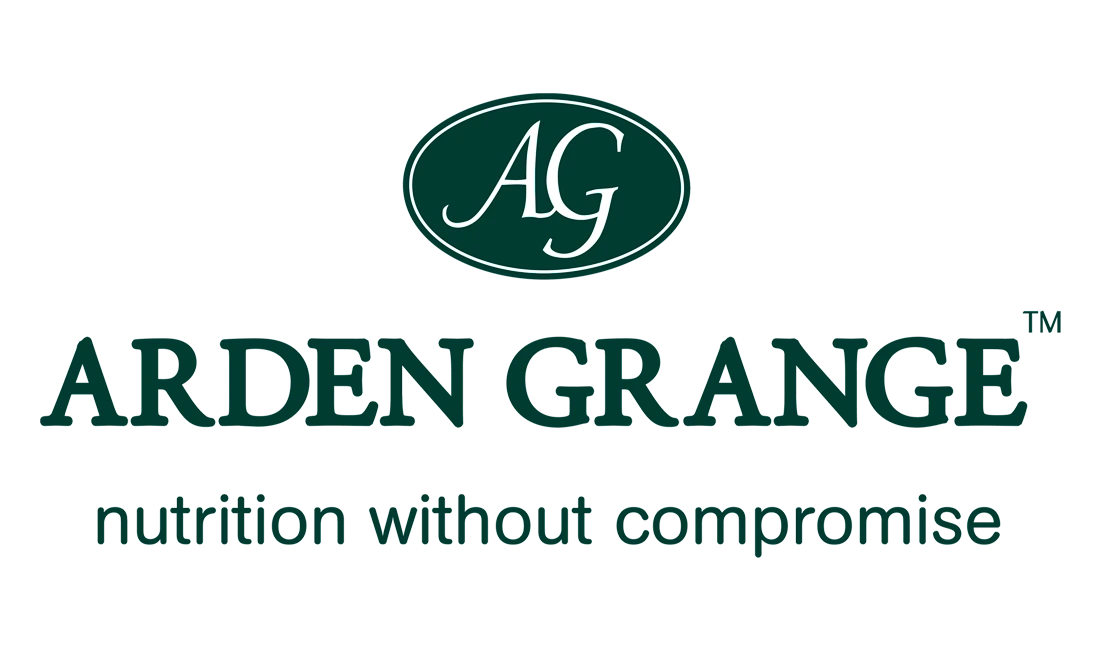Dental health care
Arden Grange do not produce a specific "dental kibble" because in order to be effective, these diets need to be either very high in fibre (to create a matrix that takes longer to bite into, enabling the kibble to engulf the tooth before splitting and exposing the fibres to scrape over its surface), or include sodium tripolyphosphate (to bind salivary calcium so it is unavailable to build up into tartar).
High fibre diets can result in more waste, constipation or diarrhoea, while sodium tripolyphosphate is an ingredient that some owners are wary of due to its potential toxicity.
Your vet may have recommended a veterinary dental diet, but what happens if your cat or dog fails to digest it well, is known to be sensitive to one or more of the ingredients, or refuses to eat the product?
The good news is that looking after your dog or cat’s dental health is not limited to feeding a veterinary diet. In fact, most vets suggest these products as an adjunct to teeth cleaning.
Plaque can very quickly turn to tartar (within 4-5 days) and whilst plaque is quite easy to remove by careful brushing (it's a thin film of bacteria and food particles), the hard yellow tartar deposits can only be effectively removed by your vet. The key is to try to stop the accumulation of plaque and ensure it’s removed before the tartar can develop. Please keep in mind that some animals are genetically predisposed to dental disease, and unfortunately may develop problems despite regular home dental care and the use of an excellent quality diet such as Arden Grange which includes nutrients to promote healthy teeth and gums.
Antioxidants are substances which protect the cells of the body from unstable molecules known as free radicals. Antioxidants interact with and stabilise these free radicals, and thus prevent some of the damage they might cause if allowed to accumulate.
Antioxidant enzymes occur naturally in the body, but low levels or inhibition of these enzymes can affect the body’s ability to detoxify and to repair cell / tissue damage. This results in oxidative stress, which in both humans and animals is associated with ill health. Additional antioxidant protection by means of diet is the sensible solution to the free radical problem.
Antioxidants have many benefits and are used in dentistry to help combat free radicals involved in benign disease or premalignant lesions [Mufeed et al., 2014]. The Arden Grange range includes a number of antioxidant sources including certain vitamins, minerals and plant extracts , many of which work in synergy with one another (to each other’s mutual benefit). Dietary antioxidants however are not interchangeable, and many differ in both their site of action and their mechanism. Studies have demonstrated that a combination of antioxidants limits cell damage in dogs and cats [Sechi et al., 2017], hence why diversity is important.
Vitamin C (which itself has powerful antioxidant properties) is of particular note in dentistry, since it helps the lining of the gums to stay healthy despite the large number of bacteria that inhabit your pet’s mouth. Healthy gums isolate the bacteria from the roots of the teeth despite their close proximity. When bacteria start to penetrate the gums, through tiny lesions or weakened lining, it is within the gums that the immune system fights to eradicate the harmful bacteria and to ensure the health of both the gums and the underlying tooth-supporting ligaments and bone.
Bioflavonoids (plant derived compounds with antioxidant properties) are thought to significantly enhance the absorption of vitamin C, and possibly to prolong the effectiveness when they are combined. They also contain active substances that inhibit the enzymes which enable the oral bacteria to stick to the teeth.
The Arden Grange products all include:
- A highly bioavailable source of vitamin C, along with the other antioxidant vitamins - vitamin E and folic acid (B9), as well as beta carotene (a precursor of vitamin A).
- Antioxidant minerals (selenium, zinc, copper and manganese) from sources that are easily absorbed and utilised. Zinc is of particular importance. Even though it is naturally present in saliva, plaque and dental hard tissues, it can help to slow down tartar build-up and has antiseptic properties [Fatima et al., 2016].
- Bioflavonoid plant extracts. There’s cranberry extract and yucca extract in every recipe (including the Partners canned food and Crunchy Bite treats). These are primarily included to help support the urinary system and reduce odour respectively, but their antioxidant activity is not limited to those particular areas. Adult Large Breed, Senior and Sensitive Light/Senior contain the highest level of cranberry (400mg/kg).
- Additional antioxidant sources (green tea and grape seed extract*) in the Crunchy Bites. These ingredients are also in the Performance dog food, alongside quercetin (a plant extract derived from citrus fruits including oranges). Performance also contains a higher level of cranberry and yucca.
- MSM, which is short for methylsulfonalmethane. We use MSM in all of dry products in conjunction with glucosamine and chondroitin for joint support, but in addition to its well documented anti-inflammatory properties [Butawan et al., 2019] this functional ingredient can increase the level of naturally occurring glutathione (a potent naturally occurring antioxidant produced within the body). The Arden Grange products do not include added sugars. Although dogs and cats are not prone to tooth decay in the same way as people (they don’t produce salivary amylase – the enzyme that starts the process of starch digestion in the mouth), it does make sense to avoid sticky, sugary foods because even if they are not directly responsible for problems in our pets, they still act as a food source and growth medium for bacteria. Contrary to popular belief, the most common cause of dental disease in dogs is not the consumption of carbohydrates, but the overgrowth of Streptococcus and Actinomyces bacteria. Genetics can play a part too, and an overcrowded mouth or incorrect bite increases susceptibility. In cats, oral bacteria is also a primary cause, and gingivitis (inflammation of the gums) can be brought on by certain conditions including feline leukaemia virus, feline immunodeficiency virus, feline calicivirus, renal disease and diabetes.
Antioxidants are substances which protect the cells of the body from unstable molecules known as free radicals. Antioxidants interact with and stabilise these free radicals, and thus prevent some of the damage they might cause if allowed to accumulate.
Antioxidant enzymes occur naturally in the body, but low levels or inhibition of these enzymes can affect the body’s ability to detoxify and to repair cell / tissue damage. This results in oxidative stress, which in both humans and animals is associated with ill health. Additional antioxidant protection by means of diet is the sensible solution to the free radical problem.
In both species, poor nutrition can cause or exacerbate dental problems, especially diets that are deficient in the minerals and minerals responsible for healthy teeth (including calcium, phosphorous, vitamin A and vitamin D).
Crunching on kibble has limited, if any, benefits to your dog or cat’s teeth. In fact, animals with dental problems may find soft food easier to manage. You can soak the dry Arden Grange food to soften it, and this does not lessen the antioxidant activity or reduce the bioavailability of the other nutrients that are important for oral health.
The most effective way to keep the teeth clean is with a soft toothbrush (made for pets) and a special toothpaste human tooth paste should never be used because it may contain xylitol which is toxic to cats and dogs, and almost always contains fluoride which is also dangerous for them to consume). It’s appreciated that not all dogs (and especially not cats) are amenable to this, and unless they have been accustomed to it from an early age, it can be hard to get them to accept brushing. For dogs and cats who detest the toothbrush, an enzymatic paste (that stops the soft plaque turning to hard tartar) such as Logic Gel can be smeared on to a grooved dental toy. The mechanical action of chewing helps to clean the teeth. It can also be applied to knotted rope toys for dogs, and a good game of tug almost has a dental floss type action.
A finger stall may be better tolerated if you are having difficulties with a brush. Lintbells YuCARE Tooth Cleaner has 12,000 more micro-cleaning fibres than a toothbrush to help destroy bacteria on contact. Each fibre contains special antibacterial silver ions that destroy bacteria on contact, while the cleaning action massages the gums to maintain oral health. Lintbells YuCARE Tooth Polish can be used up to 4 times a week with the Tooth Cleaner.
Proden produce a patented seaweed supplement (Proden Plaque Off) which is popular and easy to use. Clinical trials have demonstrated that the regular use of this specific seaweed (Ascophyllum nodosum) is effective in helping to reduce plaque and calculus [Gawor et al., 2018]. The advantage of a product like this is that it is free from artificial colourings, preservatives and gluten. Because it is only required in small quantities, it is also low calorie. Most commercial dental sticks and treats for dogs and cats are unfortunately not hypoallergenic and supply a significant number of extra calories.
Important Note: Plaque Off does contain a high level of iodine, so may not be suitable for animals undergoing thyroid treatment. It is also not recommended for pregnant or lactating bitches / queens.
There are many options available, and it is important to select a suitable size, density and design to fit your pet’s individual chewing style. Antlers are popular but should not be given to dogs who already have any dental problems as they are hard and may cause brittle or damaged teeth to fracture. Root or bark chews are softer alternatives. For cats, look for specially textured toys with catnip for added interest.
As a responsible and ethical company, Arden Grange fully appreciate that caution must be taken when discussing the potential benefits of nutritional supplements and ingredients. Whilst supplements such as the antioxidants included in the Arden Grange range are very safe, and may be beneficial to some of the cats and dogs fed on Arden Grange, we must highlight that their inclusion is not a substitute for veterinary intervention in the case of a sick animal.
* Grape seed extract is a source of oligomeric proanthocyanidins which have antioxidant properties and complement vitamin C, enhancing its effect. Antioxidants are important because they help to protect the body against the harmful effects of free radicals. Grape flesh is toxic to some animals, but the extract from the seed is not associated with any harmful side-effects.
Butawan, M., Benjamin, R., and Bloomer, R., 2017. Methylsulfonylmethane: Applications and Safety of a Novel Dietary Supplement. Nutrients, 9(3), p.290.
Fatima, T., Haji Abdul Rahim, Z., Lin, C. and Qamar, Z., 2016. Zinc: A Precious Trace Element For Oral Health Care? - Pubmed - NCBI. [online] Ncbi.nlm.nih.gov. Available at: [Accessed 2 April 2020].
Gawor, J., Jank, M., Jodkowska, K., Klim, E. and Svensson, U., 2018. Effects of Edible Treats Containing Ascophyllum nodosum on the Oral Health of Dogs: A Double-Blind, Randomized, Placebo-Controlled Single-Center Study. Frontiers in Veterinary Science, 5.
Mufeed, A., Reshma, V., Bharadwaj, P. and Kaushik, P., 2014. Role of Antioxidants in Dentistry. Journal of Dental Panacea, 1(2), p.1.
Sechi, S., Fiore, F., Chiavolelli, F., Dimauro, C., Nudda, A., and Cocco, R., 2017. Oxidative Stress And Food Supplementation With Antioxidants In Therapy Dogs. [online] PubMed Central (PMC). Available at: [Accessed 2 April 2020]


 Puppy
Puppy
 Adult
Adult
 Senior
Senior
 Sensitive
Sensitive
 Treats
Treats Kitten
Kitten
 Adult
Adult
 Senior
Senior
 Trusted British Brand
Trusted British Brand

